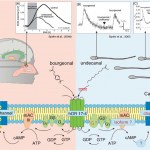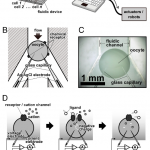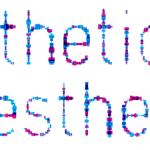synthetic aesthetics
I'm making my way up to SB 5.0 for what promises to be a great conference. If you're going too, come say hi and smell some cheeses during the poster session!
Synthetic biologists work on designing living cells, but engineered bacteria don't usually come up when you think of "designer" things. This year however, a synthetic biology design is up for a Brit Insurance Design of the Year award, up against the Lanvin Spring collection, Angry Birds, and Rock Band 3! Designers Daisy Ginsberg and James King worked in collaboration with the 2009 Cambridge iGEM team (including awesome blogger Lab Rat) to imagine ways that people could use bacteria engineered to produce pigments in the future. Check out their video about the science and design of E. chromi:
Everything has a unique chemical signature. Every body, every place. When you smell home you're sensing all the chemical traces that make up the place you grew up. When you smell your mate, you're smelling the unique combination of their body and the microbiome of their skin.
The unique smell of a city is something that my Synthetic Aesthetics partner, Sissel Tolaas, has been interested in for a long time. Yesterday in her lab I got to smell her recreations of the smells of Paris--the corner bakery, dog poop on the sidewalk, old rusty cars, cigarettes and perfume, sun on the street after…
So I was browsing the internet for info on G-protein coupled receptors and ended up finding some interesting facts about sperm. It turns out sperm don't just swim blindly, hoping to randomly bump into eggs. Instead, like bacteria, sperm can sense their chemical environment and adjust their swimming accordingly. Sperm have a sense of smell.
The (g-protein coupled) olfactory receptors in our noses that activate our sense of smell were discovered in 1991, an amazing discovery that earned the 2004 Nobel prize for physiology or medicine. The receptors sit on the surface of the cells up high in our…
Cells are constantly jibber jabbering, sending messages to each other to coordinate behavior, both within a population of single-celled organisms or between cells of an individual multicellular organism. Most of these signals are chemicals that float around in the liquid that surrounds the cells but there recently has been an increased appreciation for cells' sense of "smell"--how cells respond to chemicals that are present as gasses.
A brand new paper outlines the discovery of "olfaction" in a species of bacteria, Bacillus licheniformis. Trying to save space on a 96 well dish by putting…
A lot of synthetic biology is about getting biology to be more like electrical engineering, designing genetic "logic gates" to create a living circuit board. Beyond analogies, however, cells have many fascinating electrical properties--proteins that transfer electrons like wires, membranes that separate ions and create an electrical charge that drives the metabolism of the cell, channels through these membranes that open and close to activate an electro-biological response. Electrons are electrons whether they are in proteins or copper wires, and many scientists have designed ways to connect…
My Synthetic Aesthetics partner, Sissel Tolaas, is featured in the terrific current issue of the German interview magazine mono.kultur. Her work focuses on smell, exploring the unique smellscapes of different cities, creating provocative scents to show in art galleries, branded "logo" scents for Adidas, "Swedish" scents for Ikea, and therapeutic memory-triggering scents, part of the healing process for patients dealing with traumatic experiences. Until we have smell-o-vision, her work is almost aggressively analog--"beyond what is seen and heard to something indiscernible yet more…
I am thrilled to announce that I will be one of the Synthetic Aesthetics residents this fall. Synthetic Aesthetics is a new program run through Stanford and the University of Edinburgh and funded by the National Science Foundation and the UK's Engineering and Physical Sciences Research Council that asks the question "how would you design nature?":
Synthetic Biology is a new approach to engineering biology, generally defined as the application of engineering principles to the complexity of biology. Biology has become a new material for engineering. From biological circuits made from DNA to…






